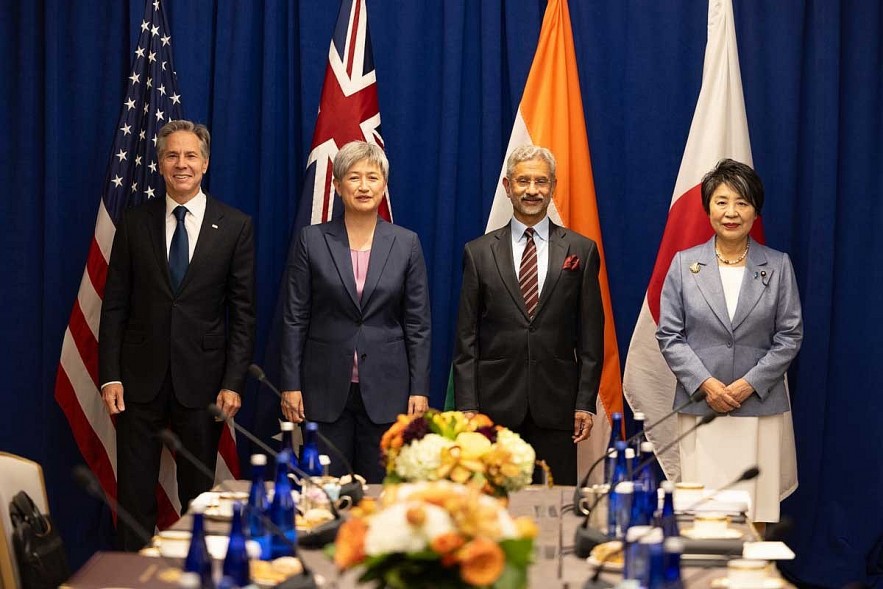
|
| Image source: X @SecBlinken |
At the forefront of our discussion is the QUAD alliance, comprising the United States, India, Japan, and Australia. This coalition of nations advocates for free navigation and open trade in the Indo-Pacific region, firmly upholding international law and maritime norms. While their partnership initially focused on military cooperation, it has since expanded to encompass a broader range of initiatives. These include addressing climate change, bolstering healthcare frameworks in developing nations through vaccination drives, and ensuring cybersecurity in the face of rapid technological advancements. The group’s efforts also extend to environmental conservation, all aimed at fostering a stable global economy.
The significance of the QUAD’s collaboration was especially pronounced during the Covid-19 pandemic, notably in maintaining the resilience of supply chains.
The origins of the QUAD date back to 2004, when the group first came together to provide humanitarian aid to regions affected by the tsunami. Within the complex geopolitical landscape of the Indo-Pacific, other countries often find themselves acting as mediators in the long-standing tensions between India and China. At the heart of this rivalry is their economic competition in technological advancement and trade, shaped by differing definitions of “development” and the means to achieve it.
The world bears witness as these two nations vie for dominance as the preeminent superpower and representative of the Global South. India is making remarkable strides, evidenced by its economic dynamism, military expansion, and diplomatic initiatives. Notably, India has introduced its lending program, the Neighborhood First Policy, as a counterpart to China’s Belt and Road Initiative (BRI).
In the post-Cold War era, the absence of strategic competition in the Indian Ocean afforded New Delhi not only a prominent role but also the opportunity to secure the region in alignment with its strategic interests. However, with the emergence of China as an alternative security provider, India, under the leadership of Prime Minister Narendra Modi, has had to reevaluate its foreign policy options.
Over the last decade, China has strategically developed ports along India’s southern coast, forming a “string of pearls” that constrains India’s access to global markets. In response, India has forged alliances to counter this move, creating a “diamond chain” to restrict China’s maritime access to the Indian Ocean, the East China Sea, and the South China Sea.
On the diplomatic front, India has overtaken China as the world’s most populous country, boasting 1.43 billion consumers. It has risen to become the fifth-largest global economy, consistently growing at a rate of six to seven percent annually. India now ranks fourth in global military strength and nuclear power, 11th in diplomatic strength, fourth in innovation and technology, and seventh in the number of filed technological patents. It is also the eighth-largest recipient of foreign direct investment. Prime Minister Narendra Modi has embarked on a diplomatic campaign, reaching out to countries with shared interests. Since 2014, he has made 84 trips abroad, covering 71 countries.
France Offers Tech to Make Indian Navy’s Submarines Stealthier in the Indian Ocean Region
France has proposed an exciting upgrade for India’s Project 66 and Project 77 submarines: advanced pump-jet propulsion technology. This cutting-edge innovation promises to elevate the stealth, maneuverability, and operational prowess of India’s underwater fleet, fortifying its presence in the Indo-Pacific region. With this technology, India’s submarines will gain unparalleled agility and efficiency, enhancing their strategic capabilities to a new level.
Welcoming a Dignitary: A Presidential Affair
On the morning of August 1, President To Lam hosted a formal welcome ceremony for the President of Timor-Leste, José Ramos-Horta, at the Presidential Palace in Hanoi. The ceremony, a highlight of Ramos-Horta’s four-day state visit to Vietnam, was a solemn and prestigious affair, marking a significant moment in the relationship between the two nations.
China Rejects Unlawful Maritime Claims on 2023 Standard Map
The US has strongly denounced China’s new official map of the South China Sea, asserting that Chinese territorial claims are illegal and in violation of international law. India, Vietnam, the Philippines, Malaysia, and Nepal are among a number of other countries which have also rejected the map, as well as China’s maritime claims in the region. The US State Department declared that such claims must be respected according to international regulations.








